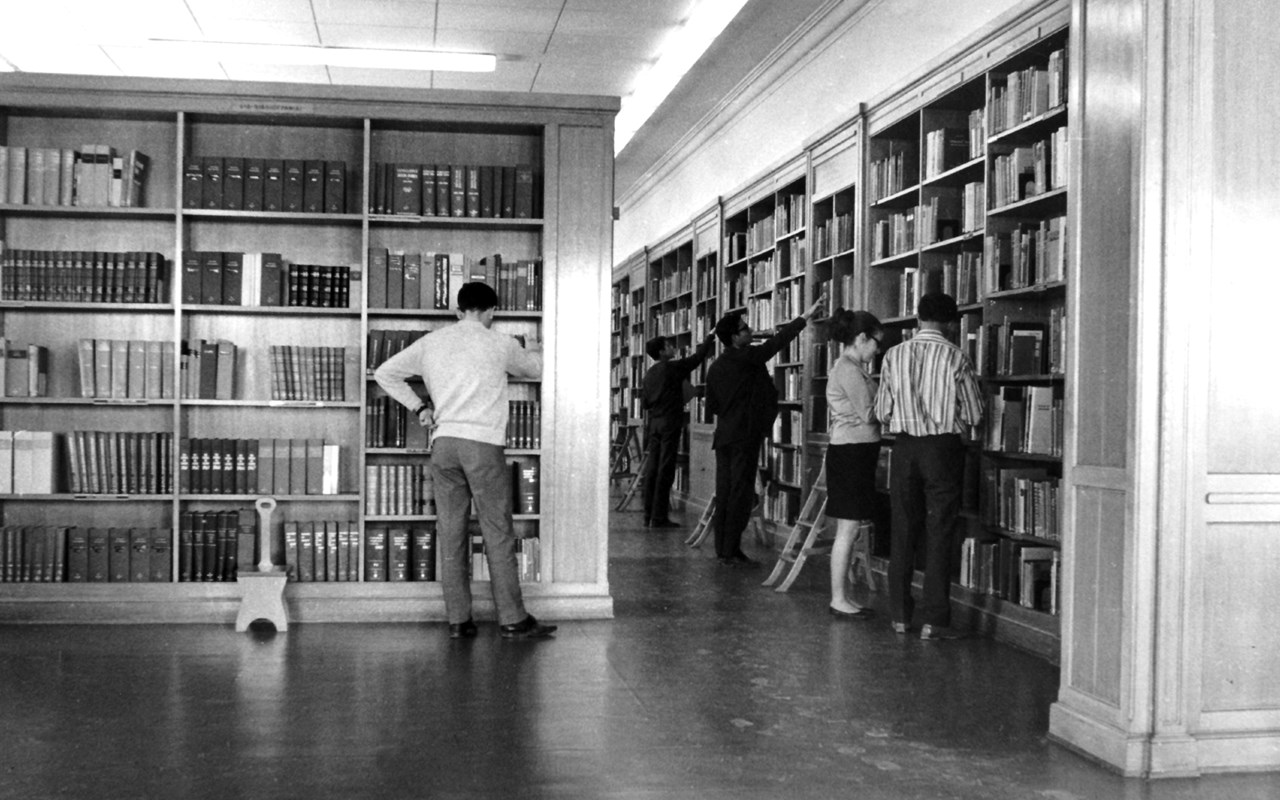l
The EF Library
History and purpose of the Library
The Eugenides Foundation Library opened its doors to the public on 7 June 1966. Since then, it contributes continuously to the realization of the Foundation’s goals.

The Eugenides Foundation Library opened its doors on 7 June 1966 as a lending library with open access to the public, on the same day that the Foundation’s building on Syngrou Avenue was inaugurated. However, the work for its proper organization had already begun in 1962, when the Foundation’s offices were still housed at 10 Panepistimiou Street.
The Library serves the goals of the Foundation, that is, to contribute towards the education of young Greeks in the scientific and technical fields. This purpose also determines the Library’s form as an educational, specialized scientific and technical library.
In this context, the Library offers students (at high school, technical school, and university levels) the appropriate aids for their studies. It also offers professional technicians and scientists the opportunity to be informed about new advances in technology and science and in this way helps them in their work or research.
Another main concern of the Library is the acquisition of books required by the Foundation’s Publications Committee and authors.

EF Library
Photo Credits: e.f_
First Period
When the Library opened its doors to the public, its collection consisted of about 4000 books and 250 journal titles in English, French, German and Italian concerning all branches of science, technology and shipping. At the same time, the Library included a collection of the most representative books of Greek literature and history. Much work and consistent effort was required for the Foundation to be in a position to offer, at that time, a model library to its audience.
One of the main characteristics of the Library, from the first steps of its establishment to the present day, is the continuous application of the most appropriate and modern methods and standards. For the thematic organization of the collections, the Dewey Decimal Classification system was applied. A second thematic description was accomplished through indexing.
Among the most useful tools of the Library were its bilingual card-catalogue and its subject catalogue. At the time this was considered as pioneering work, since until then there had not been any tools using an established Greek terminology, especially in the fields of science and technology. A simple and easy-to-use system was also chosen for lending.
The experience and knowledge gained from organizing and operating the Library, combined with international practice, were recorded in two manuals that were produced by the Library staff at the time:
In 1970 the Eugenides Foundation published the book Η Βιβλιοθήκη. Οργάνωσις – Λειτουργία [The library: organisation – operation], written by Roxani Fessa and Kari Litsa. This served as the first-ever librarians’ manual published in Greek.
- In 1978 Roxani Fessa, Kari Litsa and Clairi Lendari translated into Greek and adapted the Dewey Decimal Classification for Greek history books. This manual was published by the Association of Greek Librarians.

Library Organization
Photo Credits: e.f_
Library Organization
From 1962 to date
Since 1962, when the Library was established, methods of library organisation have changed both in terms of advancements in the field of information and communication technology, but also in relation to society’s needs, which are reflected in the library readers’ community.
As such, the Eugenides Foundation Library took advantage of new conditions in order to satisfy the needs of its readership, which has grown spectacularly over time. Based on this information, the Foundation’s Management decided to extend the Library and modernize its equipment and services.
Expansion related both to the allocation of additional Foundation building space to the Library and also to the enrichment of its collections with subject areas other than science and technology, which resulted in the creation of additional reading rooms and new subject categories.
The Eugenides Foundation Library started procedures for the computerization of its material in 1990, at the same time absolutely respecting the basic principles on which it was originally organized. In parallel, the Library moved a level further by already adding electronic material to its printed collections, in that way transforming into a ‘hybrid’ library, which constitutes the common library form today.
The need for this transformation was initially observed when the first databases, with the significant facilities they offered, began to appear and was accentuated especially after the emergence of the Internet.
In 1995 the Eugenides Foundation first connected to the Internet via a permanently leased line, and the Library undertook the responsibility to create the Foundation’s early web-pages. On these web-pages remote users could access the Library’s online catalogue. It is noteworthy that the EF Library was one of the first in Greece to offer its members free use of the Internet for educational and research purposes.
In the context of its evolution, since the end of 2000 the EF Library has developed a number of new activities. These are generally aimed at:
- Readers further understanding the new capabilities for information dissemination that a library can offer.
- Acquainting the general public with science in a pleasant way.
- Increasing readership.
- Supporting members in their quest for lifelong learning.
Main Activities
Computer Lessons
Since October 2006 the Eugenides Foundation Library, in cooperation with ECDL Hellas, offers its members the “Computer Learning for Ages 40+” programme. This programme is aimed at people aged 40 and above who face difficulties or cannot enjoy digital services at all and helps them to become acquainted with the capabilities and operation of computers.
Book Evenings
These evenings are for readers to meet and discuss a scientific book or series of books on a scientific topic. This Library initiative aims to acquaint the general public on the one hand with scientific books, especially Greek ones, and on the other with the subjects covered by the books presented.
Children’s Events
‘One book, a wonderful adventure!’ is the overall title of a successful series of events organized for children by the Youth Department of the EF Library. This series constitutes a creative vehicle through which our young friends may reach out to knowledge, get in touch with books and the institution of the library and to develop an interest in science in a pleasant and entertaining way.
The Book Club
An innovative ‘love of reading’ programme – a modified book club – was started by the Library in 2015. In this programme, children, accompanied by an adult family member, work together to become autonomous Library users, acquire new, interesting reading habits, familiarize themselves with known authors’ works and discover their relationship to science.
Educational Programmes
The Library runs free educational programmes on a daily basis, involving approximately 3000 students of all educational levels each year.
All of these Library activities have attracted many people, resulting in approximately 30,000 visitors per year and a membership of over 55,000.
From the beginning of 2018 the Library entered a phase of re-engineering, so as to adapt optimally to evolving conditions and new developments. In this new era, the Eugenides Foundation Library will continue to operate as a ‘hybrid’, placing emphasis on increasing its digital material collections with the objective of providing full support to specific cutting-edge marine, scientific and technical topics.
l


